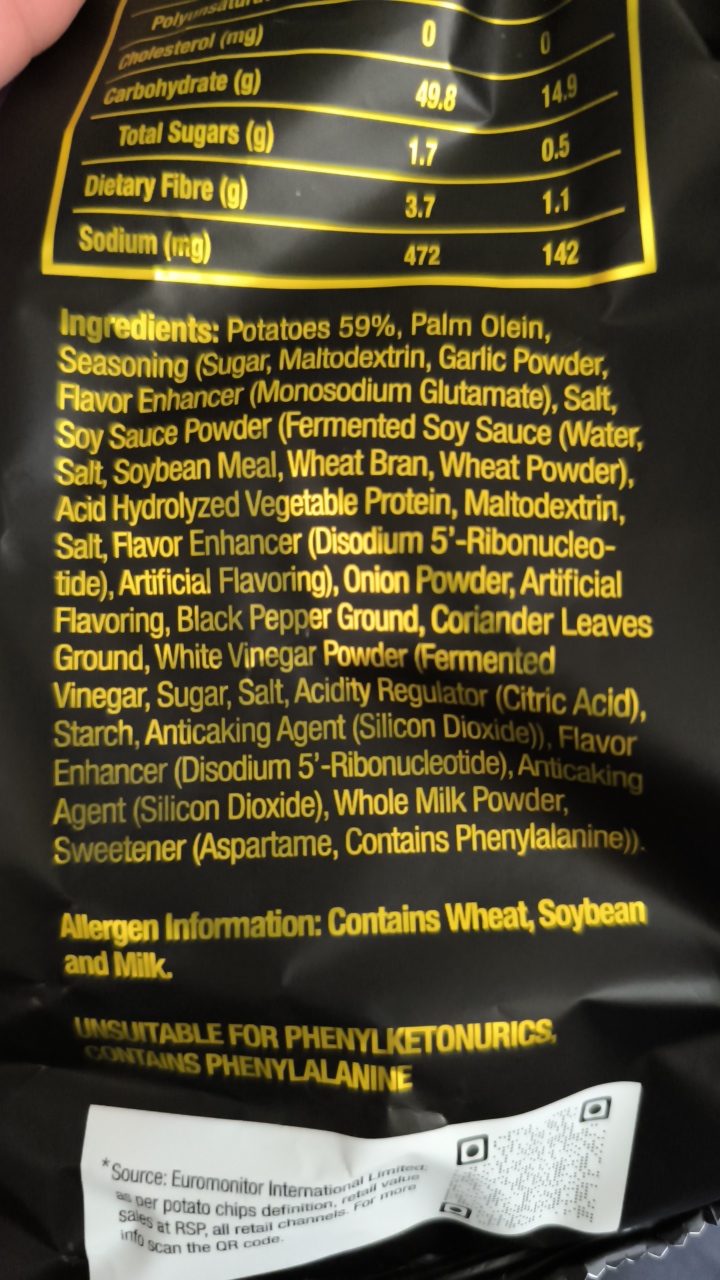
Barcode: 1200108001049
potatoes
HALAL
📝 Reason: According to Islamic dietary laws (Quran 5:3), all plant-derived and mineral ingredients are Halal by default, unless processed with Haram substances. However, artificial flavoring, some flavor enhancers (e.g., disodium 5′-ribonucleotide, E635), and fermented soy sauce powder are marked Doubtful due to potential inclusion of alcohol or animal-based derivatives. Absence of Halal certification justifies ‘Doubtful’ rating for these. Always consult reliable Halal authorities such as IFANCA and examine ingredient sources closely.
🏷️ Category: Chips
📄 Certificates: Unsuitable For Phenylketonurics, Contains Phenylalanine
Ingredients:
Details
Understanding the Halal Status of Potatoes
Potatoes are a staple food enjoyed by many around the world. But for those following Islamic dietary laws, it’s essential to ensure that their food is Halal. The product in question is a mixture that includes potatoes and several other ingredients. We will take a closer look at their Halal status based on Islamic dietary laws.
What Makes Potatoes Halal?
According to Islamic dietary laws (Quran 5:3), all plant-derived and mineral ingredients are Halal by default. In the case of potatoes, they are simply natural vegetables, devoid of any inherent religious concerns. Therefore, fresh potatoes are universally recognized as Halal, with no associated Haram (forbidden) processing. Potatoes provide essential nutrients, making them a healthy addition to any meal.
Ingredients Breakdown: Are They Halal?
Now let’s delve deeper into the ingredients present in this product to evaluate their Halal statuses collectively:
- Potatoes: Fresh vegetables, inherently Halal. Source
- Palm Olein: A vegetable oil derived from palm fruits, considered Halal unless contaminated with animal-based additives. Source
- Sugar: Generally Halal unless processed with bone char. Typically derived from sugarcane or sugar beets. Source
- Maltodextrin: Usually derived from starch, Halal by general standards. Source
- Garlic Powder: Entirely plant-based and Halal. Source
- Flavor Enhancer (Monosodium Glutamate): Often derived from fermented starch/sugar, Halal if no animal derivatives are present. Source
- Salt: A natural mineral, always Halal. Source
- Soy Sauce Powder: The fermentation process can create trace alcohol, hence its Halal status is uncertain. Source
- Acid Hydrolyzed Vegetable Protein: Plant-based, Halal if derived from Halal plants. Source
- Artificial Flavoring: Potentially contains harmful animal derivatives; status classified as doubtful. Source
- Onion Powder: Pure, derived from onion and Halal. Source
- Black Pepper: A spice derived from plants, always Halal. Source
- Coriander Leaves: Purely plant-based and always Halal. Source
- White Vinegar Powder: Halal as it is produced from the fermentation of alcohol. Source
- Citric Acid: Commonly derived from plants/microbes, consistently Halal. Source
- Starch: Generally plant-derived; Halal unless processed with animal derivatives. Source
- Silicon Dioxide: A mineral, Halal. Source
- Whole Milk Powder: Derived from cow’s milk; inherent Halal unless specified otherwise. Source
- Aspartame: A synthetic sweetener, typically Halal. Source
Conclusion on Halal Status
The majority of ingredients in this product, including the primary component, potatoes, are Halal. However, the presence of certain flavor enhancers and artificial flavoring raises concerns of a ‘Doubtful’ classification due to potential processing issues or undisclosed sources. Individuals seeking Halal products should always refer to reliable Halal certification bodies such as IFANCA and scrutinize product labels, particularly in the case of processed foods.
This product, therefore, may not entirely meet Halal consumer standards due to the potential for non-Halal elements in specific additives. Always consult Halal authorities before consumption to ensure compliance with Islamic dietary laws.
